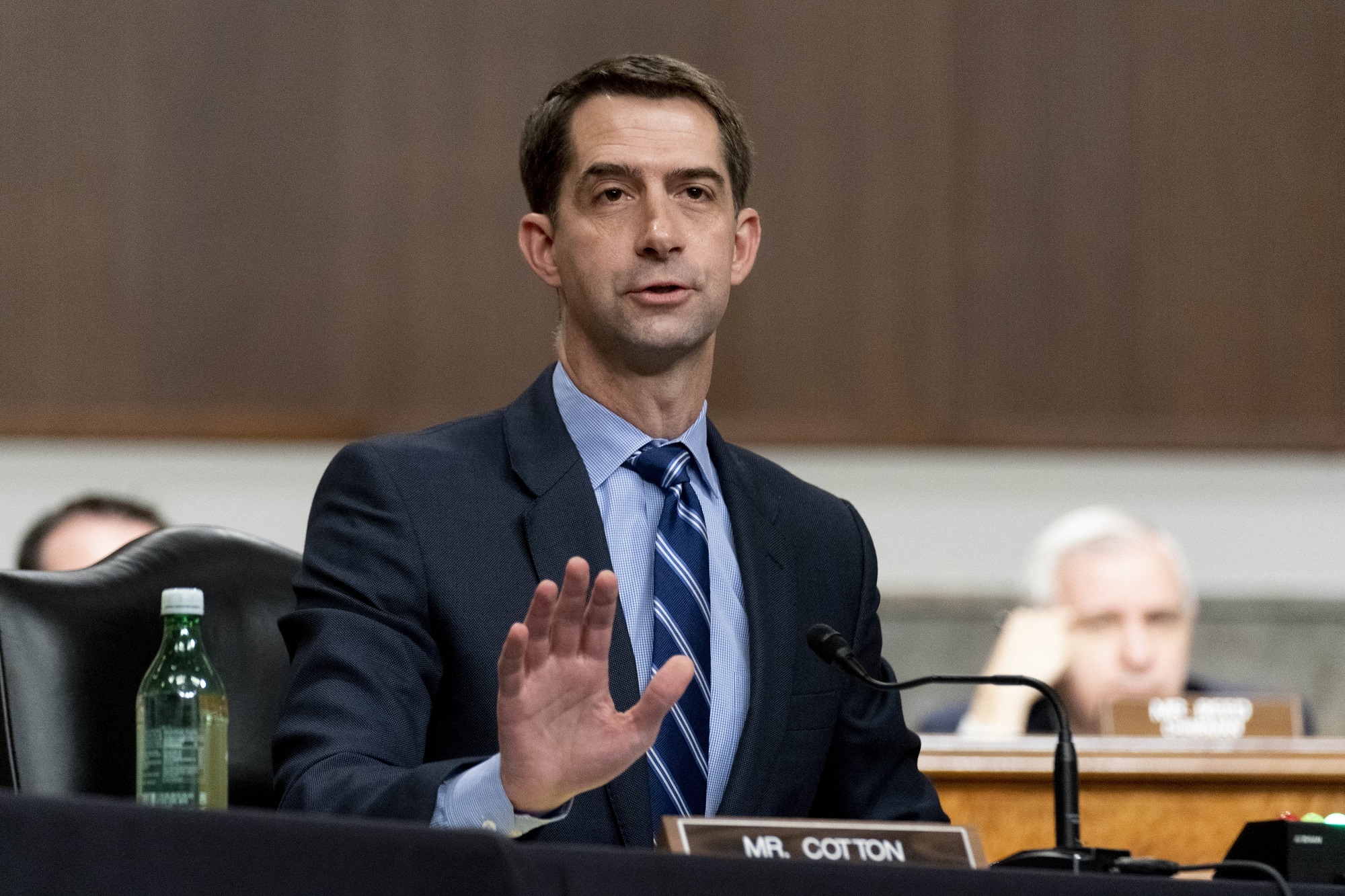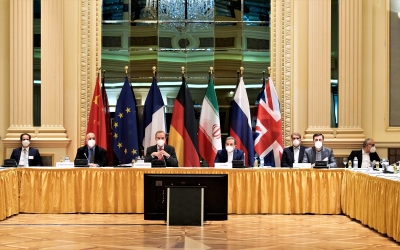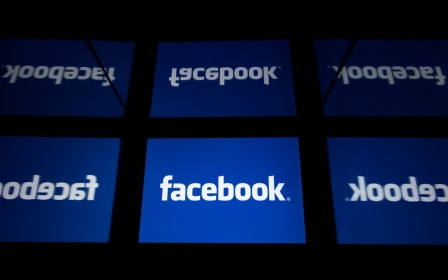Republicans are ramping up opposition to Iran deal. Does it matter?

US Republicans are ramping up opposition against the Iran nuclear deal in a sign of growing partisan division over Washington's approach to Tehran.
As indirect talks between signatories to the nuclear pact began in Vienna this week, several leading Republicans have issued statements denouncing President Joe Biden's push to revive the agreement, known as the Joint Comprehensive Plan of Action (JCPOA).
Republican president Donald Trump had nixed the deal in 2018.
"The United States must not relinquish its leverage over the Iranian regime just to return to the JCPOA, a severely flawed agreement that undermines our national security interests due to its arbitrary sunsets and limited scope," four leading Republicans on powerful Senate committees wrote to Biden on Tuesday.
In a separate statement, Republican Senator Joni Ernst said returning to the deal was "unwise for the safety and security of our nation". Tom Cotton, one of the most hawkish senators, has been tweeting incessantly against the JCPOA over the past few days.
Congressman Lee Zeldin, a staunch Trump backer, accused the Biden administration of "offering up an embarrassingly pathetic fold" to Iran. Nikki Haley, former envoy to the UN and possible 2022 Republican presidential candidate, said Biden was "desperate to go back to a deal that is good for Iran and bad for America".
The flood of statements from Republican lawmakers and former officials show that the GOP is set on portraying Biden's Iran policy as weak, if not deliberately against US interests. But can their opposition derail efforts to return to the deal?
"It's very problematic, but it does not necessarily block President Biden from following through on his commitment to get back into the deal," Ryan Costello, policy director at the National Iranian American Council (NIAC), said of the Republican push against the JCPOA.
"The president still retains all his authorities to lift sanctions, waive them and remove entities from the list of 'specially designated nationals' held by the Treasury Department, so he retains full authority to negotiate and get back in the deal."
The talks
Then-president Barack Obama signed the multilateral agreement through executive action in 2015.
The deal saw Iran scale back its nuclear programme in exchange for lifting sanctions on its economy. Through executive action as well, Trump withdrew Washington from the deal and started his maximum pressure campaign of sanctions against Tehran.
In 2015, Congress passed the Iran Nuclear Agreement Review Act requiring the administration to periodically certify Iranian compliance with the deal.
The legislation allows Congress to pass a resolution of disapproval of the agreement, but for such a measure to succeed it would need a two-thirds, veto-proof majority in both the Senate and House of Representatives.
Biden's Democratic Party currently holds a slim majority in both chambers, a more advantageous position than that of Obama in 2015, when Republicans controlled Congress but still failed to stop the pact.
'The United States must not relinquish its leverage over the Iranian regime just to return to the JCPOA'
- Republican senators
Costello accused Republicans of lying to rally their base against the JCPOA, citing Senator Ernst's statement which said that the deal "gave America no oversight over Tehran’s nuclear capabilities and actions".
In reality, the agreement implemented a stringent inspection programme by the UN nuclear watchdog (IAEA) and diminished Tehran's nuclear capabilities. Even Trump administration officials had certified that Iran was living up to its commitments to the agreement.
"Republicans are really trying to create a fantasy about the agreement... that it gives Iran a nuclear weapon. That's the opposite of what the deal does," Costello told MEE. "We've seen Iran move much closer to a nuclear weapon under their preferred policy implemented by president Trump."
Iran has been enriching uranium beyond the limits set by the pact in response to the US maximum pressure campaign.
Biden and his aide say they are seeking a return to the deal, but they plan on seeking a "longer and stronger" agreement and then use it as a platform to discuss other outstanding issues with Tehran, including its ballistic missile programme and regional policies.
Iranian officials are insisting that all US sanctions, including non-nuclear related measures imposed by the Trump administration, must be removed to revive the accord. The Biden administration, however, is calling for a synchronised, gradual and mutual return to compliance.
Representatives from Iran and signatories to the deal - the UK, France, Germany, Russia and China - have been holding talks in Vienna this week. A US delegation is participating in them indirectly through separate meetings with European intermediaries.
Political calculations
The White House has said that it expects the negotiations to be a long process. But the mere idea of talks to revive the JCPOA is sparking Republican outrage.
Still, despite his reputation as a centrist who favours bipartisanship, as president, Biden has been seemingly pushing his agenda without seeking to please the opposition.
For example, earlier this year, he signed an enormous $1.9 trillion Covid-19 relief bill that did not receive support from a single Republican in Congress.
"I've actually been surprised by Biden's willingness to say: 'We're gonna do what we need to do.' And I think that also applies to foreign policy," said Marcus Montgomery, a fellow at the Arab Center Washington DC who tracks congressional affairs.
With Congress up for grabs in less than two years from now in the 2022 midterm elections, Republicans will likely highlight Biden's Iran policy as a failure. But a recent survey by the Chicago Council on Global Affairs showed that 57 percent of American respondents back the JCPOA.
Moreover, with crises piling at home with the spread of the coronavirus, Iran does not appear to be on Americans' list of top electoral priority. Over two presidential debates last year, foreign policy was barely mentioned.
"I think Republicans overestimate how much the everyday Americans care about foreign policy writ large, but especially Iran... So political considerations are kind of moot," Montgomery told MEE.
Barbara Slavin, director of the Future of Iran Initiative at the Atlantic Council, wrote last week that the US president's efforts to rejoin the agreement are unlikely to be deterred by Republican objection.
"Republican hawks and former spokespeople for the Trump administration will continue to call the progress 'appeasement'," Slavin said in an article published on the Council's website.
"The Biden administration will ignore them and do what needs to be done to salvage a key achievement for multilateral diplomacy and non-proliferation."
Middle East Eye propose une couverture et une analyse indépendantes et incomparables du Moyen-Orient, de l’Afrique du Nord et d’autres régions du monde. Pour en savoir plus sur la reprise de ce contenu et les frais qui s’appliquent, veuillez remplir ce formulaire [en anglais]. Pour en savoir plus sur MEE, cliquez ici [en anglais].






